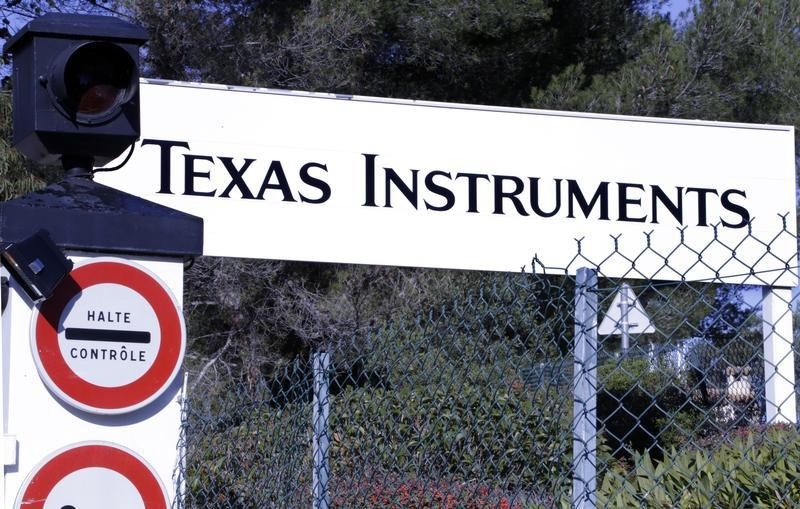On Thursday, Bernstein SocGen Group maintained its Underperform rating and $140.00 price target for Texas Instruments (NASDAQ:TXN), ahead of the company's third-quarter earnings report for 2024. The firm's analyst highlighted concerns about the company's fourth-quarter seasonality and the potential overestimation of forward-looking financial estimates by others in the market.
The analyst's projections for Texas Instruments' third quarter of 2024 (Q324) are set at $4.10 billion in revenue with a gross margin of 58.2% and earnings per share (EPS) of $1.36. These figures are closely aligned with the consensus, which anticipates $4.12 billion in revenue, a 58.4% gross margin, and $1.37 EPS. The similarity suggests a general market agreement on the company's immediate financial health.
However, the analyst expressed a more cautious stance for the fourth quarter of 2024 (Q424), estimating Texas Instruments' revenue at $3.97 billion with a 58.5% gross margin and $1.31 EPS. This is notably lower than the market consensus, which expects $4.08 billion in revenue, a 58.4% gross margin, and $1.36 EPS.
The discrepancy indicates a belief that the market may be overly optimistic about the company's performance in the latter part of the year.
For the full year of 2024, the firm's analyst has projected Texas Instruments' revenue at $15.6 billion with a 58.0% gross margin and $5.10 EPS, which is below the consensus forecast of $15.7 billion in revenue, a 58.0% gross margin, and $5.14 EPS.
Looking further ahead to 2025, the analyst's projections are even more conservative, forecasting $17.1 billion in revenue with a 58.9% gross margin and $5.88 EPS, compared to the market's more bullish expectations of $17.9 billion in revenue, a 59.4% gross margin, and $6.35 EPS.
The caution expressed by the Bernstein SocGen Group analyst suggests that there may be potential challenges for Texas Instruments in meeting the market's expectations in the near to medium term, particularly in the fourth quarter of 2024 and the full year of 2025.
In other recent news, Texas Instruments has been under the spotlight for several key developments. The semiconductor company has raised its quarterly cash dividend by 5% for the 21st consecutive year, signaling a consistent commitment to shareholder returns.
On the financial front, Texas Instruments has also presented its capital expenditure projections for fiscal year 2026 and beyond, forecasting a free cash flow per share by 2026 to range between $8 to $12, which surpasses analyst consensus estimates.
Analyst firms have offered mixed responses to these developments. Rosenblatt has maintained a Buy rating on Texas Instruments, highlighting the company's steady booking and loading improvement. TD Cowen, on the other hand, has maintained a Hold rating, while Benchmark and KeyBanc have reiterated a Buy and Overweight rating respectively.
Texas Instruments is also under scrutiny by the U.S. Senate Permanent Subcommittee on Investigations regarding the use of its semiconductors in Russian weaponry. The hearing aims to evaluate the company's compliance with export controls designed to prevent Russia from obtaining American technology.
These are the recent developments in Texas Instruments' journey.
InvestingPro Insights
To complement the analysis provided by Bernstein SocGen Group, recent data from InvestingPro offers additional context for Texas Instruments' (NASDAQ:TXN) financial position and market performance.
As of the last twelve months ending Q2 2024, Texas Instruments reported revenue of $16.09 billion, with a notable revenue decline of 14.5% during this period. This aligns with the cautious outlook presented in the article, particularly regarding the analyst's conservative projections for 2024 and 2025.
Despite the revenue challenges, Texas Instruments maintains a strong market position with a market capitalization of $183.24 billion. The company's P/E ratio stands at 34.49, indicating that investors are still willing to pay a premium for the stock, possibly due to its established presence in the semiconductor industry.
InvestingPro Tips highlight that Texas Instruments has raised its dividend for 21 consecutive years and has maintained dividend payments for 54 consecutive years. This demonstrates the company's commitment to shareholder returns, even in the face of revenue declines. The current dividend yield is 2.71%, which may be attractive to income-focused investors.
It's worth noting that InvestingPro offers 16 additional tips for Texas Instruments, providing a more comprehensive analysis for investors seeking deeper insights into the company's prospects.
While the article focuses on near-term challenges, InvestingPro data shows that Texas Instruments has delivered a one-year price total return of 34.15%, suggesting that the market has been optimistic about the company's long-term potential despite short-term headwinds.
This article was generated with the support of AI and reviewed by an editor. For more information see our T&C.
